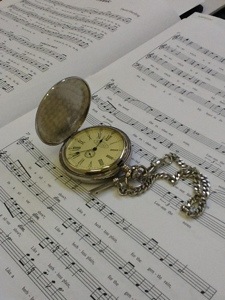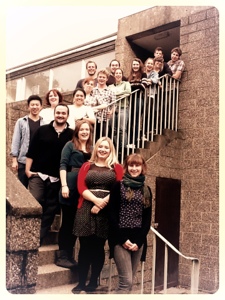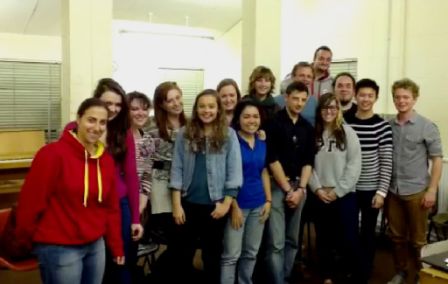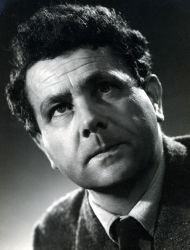The Saturday Chamber Choir workshop soon comes around in the Autumn term, and it seems only yesterday that we all met for the first time; in fact, that was three weeks ago, and so today’s all-day session appears to have rocketed into being.
For an ensemble accustomed to rehearsing from seven o’clock in the evening, meeting at 10am felt really very wrong; it was far too light outside for us to be meeting, surely… But there we were, soon engaged in some motivational warm-up exercises led by Emma that soon shook a few of the members into a state of wakefulness.
We began by returning to Handel’s Hear Thou My Weeping, which we last sang at the very first rehearsal. With the notes coming relatively quickly, the main task was to develop the range of dynamics operating across the piece, in particular the central section with its shift to minor keys and more chromatic motion. By really bringing the dynamics into sharp contrast, the return of the opening section which follows felt much more intimate in comparison; writing the drama of the middle section in broad strokes allows the contrasting outer sections to feel much more effective.
Dawn was in need of some careful tuning, and we rehearsed sections out of time, working through them chord by chord to make sure the intonation was accurate in order to bring the full spectrum of colours in the piece to life.
 The last piece before the mid-morning break was yours truly’s For the Music, in which we grappled with learning the last section, the only remaining part of the piece that was new to us; imparting a driving rhythmic verve, particularly in the opening section, will be crucial to getting the piece into motion, such that it doesn’t fall flat.
The last piece before the mid-morning break was yours truly’s For the Music, in which we grappled with learning the last section, the only remaining part of the piece that was new to us; imparting a driving rhythmic verve, particularly in the opening section, will be crucial to getting the piece into motion, such that it doesn’t fall flat.
After a break (and much-needed coffee), Emma then led the choir through a first look at Vaughan Williams’ setting of the folk-tune, Just as the tide was flowing; this piece turns out to be deceptively difficult, with lines ducking and diving all over the place; you certainly have to keep your wits about you in this one. This was followed by re-examining Finzi’s My Spirit Sang All Day, in order to establish the tuning in lots of places and makes sure we are moving through the changing harmonies with confidence; the second page represents something of a challenge here, but we have a few weeks in order to address this further.
Lunch ensued, complete with cake as today was alto Olivia’s birthday (happy birthday!), after which we resumed in gentle fashion with Lauridsen’s O nata lux; as I said to the group, this piece is rather like a piece of sacred barbershop music: the text dwells on a religious theme, but the voices are all working hard in close harmony, and it’s jolly difficult to sing with accuracy.
A revisiting of You Are The New Day allowed Emma to take the choir through the final section of the piece yet to learn, and to explore the range of dynamics throughout the work. After this came Tavener’s The Lord’s Prayer which came with ease in this, its second reading; the tranquility with which it unfolds, and its lulling harmonic repetition, means it will be wondrously effective in the Crypt concert in February; I can’t wait to try it…
The last session of the day was unexpected; discovering at lunch-time that the richly resonant hall in Eliot College was free (the move into the new music building is imminent, but sadly didn’t occur in time for us to hold the workshop in the hall), we de-camped from the unforgiving lack of acoustic in our customary rehearsal room and went to sing in Eliot’s lavish, sonorous hall. With no piano, this was our first chance to try Dawn and My spirit sang all day without a safety-net, in a more supportive acoustic – and the difference showed. By the time we’d turned the first page of Dawn, some of the group had started to grin with the sheer pleasure of singing in such a resonant echo, with all the work we’d put into capturing the range of colours and the final aleatoric page where the sopranos shimmer on an eight-note cluster-chord. The Finzi has some, shall we say, rather more hairy moments, but is getting there, and we concluded with a romp through my four Forgotten Children’s Songs , by the end of which we were singing in a circle, pretending we were back in the playground and getting positively tribal in our ensemble.
A long day, hard work, but productive; the opportunity to have sung without the support of the piano, in a kinder acoustic, will have done us good; now all that’s left, as Paris exhorted us from the soprano section, is to get the three pieces for the December concert learned by heart, so we can sing from memory unhindered by having copies. I hear the sound of a gauntlet being thrown down…




 And not only is she conducting the choir; Emma brought along ‘Welsh cake’ to the rehearsal last night, which sets a dangerous precedent for future rehearsals…
And not only is she conducting the choir; Emma brought along ‘Welsh cake’ to the rehearsal last night, which sets a dangerous precedent for future rehearsals…
